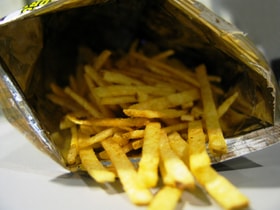
Food cravings. Those late-night gnawings. The ?I have to have it? feeling when you think about or see or smell a favorite food. And the guilt when you give in to a food craving! Sound familiar?
Food cravings make it almost impossible to not only lose weight, but also to keep it off. It?s simple?if you can?t control the food cravings, you can?t control your weight.
Control the cravings, and control your weight
I had a patient who entered my exam room a while ago. I already knew that he was going to say: ?Help me to lose weight!? And I was right. He had tried several times in the past, lost weight, but the pounds came back again very soon. Why? His food cravings.
His cravings were especially severe at night. They woke him up, making it impossible to sleep. While he was on the HCG 500 calorie-a-day diet, he used to save an apple from his lunch or dinner to eat it at night to get some sleep. But as soon as he was off the HCG diet, he rapidly gained his weight back. Reason: irresistible late night food cravings.
Is a craving all in your head, not your stomach?
Food craving is not a new problem. Scientists have studied it repeatedly, and have found that certain foods raise the level of serotonin (the chemical responsible for elevating mood) in the brain, and may also act as opiates (1).
The problem is, your body can?t maintain those good feelings. That?s why you crave those foods again and again and again?you want to keep feeling good. They?re almost like a drug craving.
But what substances are the main offenders?
Carbs and fats. Your sworn enemies.
Carbs, especially simple carbs, are the main problem. Your body isn?t designed to digest them, so they go through your system too fast. That makes your insulin, the sugar-regulating hormone, go up and down too much, creating hunger when the insulin is low. That?s why you eat cookie after cookie?your body wants to keep that sugar ?high.? Moreover, carbs usually bring up your brain?s neurotransmitter serotonin level, which makes you feel good?until the level goes down and you crave more of what made you feel good!
Fats are another craving trigger. Fortunately not all of them: olive oil and fish oil aren?t an issue?but vegetable oil (particularly corn oil) are real problems. The exact mechanism of fat ?addiction? is not known.
But where do carbs and fats come from? Apples and oranges? Fish and eggs? Cabbage and nuts? Obviously not. They come from cookies, candy, bread, potatoes, rice, etc. And guess what most of these foods have in common?they?re processed foods.
Typical advice to stop food cravings goes like this: no fast foods, eat slowly, enjoy your food, eat with your family, etc. It seems like sound advice. But does it work? In my experience, not usually. It may work for a while, but then food cravings take over. And the pounds start coming back.
So what is the solution? How do you turn off the cravings? Maybe you need to cut out the foods that cause them!
My thoughts on how to stop food cravings:
Avoid processed foods including bread, rice, potatoes, cookies and candy.
Stick with a Paleolithic diet?cave men didn?t have cravings!
Avoid caffeine, alcohol and smoking.
Get enough sleep.
More food for thought
Talk to your doctor about checking you for a hormonal imbalance and gut dysbiosis. Certain hormonal imbalances were linked to obesity, which may suggest a hormonal connection to food craving. Also, studies show that obese mice have gut flora (digestive tract microorganisms) that?s different from their lean counterparts, suggesting a gut flora link with food cravings (2).
Good luck!
References:
1. Evidence for sugar addiction: Behavioral and neurochemical effects of intermittent, excessive sugar intake http://www.ncbi.nlm.nih.gov/pmc/articles/PMC2235907/
2. http://en.wikipedia.org/wiki/Gut_flora

